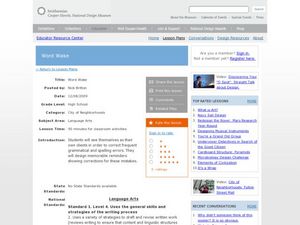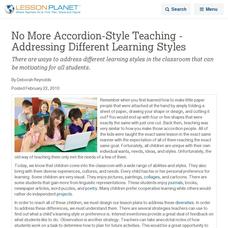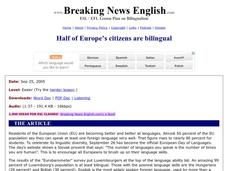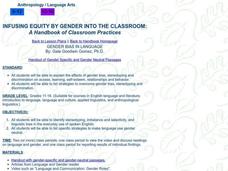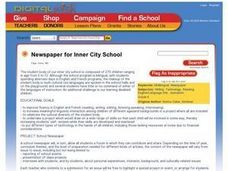Blake Education
Harry Potter and the Philosopher’s Stone
The motto for Hogwarts School of Witchcraft and Wizardry warns that one should never tickle a sleeping dragon, but learners will definitely be tickled by the activities in a packet of materials designed to accompany a reading of the...
Curated OER
Back-to-school ESL Ideas
Learners share their countries and languages, flags, cultural identity, and pride in home culture.
Curated OER
How Do You Say Hello?
Students access an online resource to study how to say hello in Spanish, Japanese, and Arabic. They complete a worksheet telling how to say hello in these three languages before practicing the proper pronunciation of each.
Curated OER
Eggs
Third graders examine a variety of information about eggs. They complete a class KWL chart, and read "Green Eggs and Ham" and "The Eggs Are Hatching" by Monica Incisa and discuss the fictional and non-fictional aspects of each book. In...
Curated OER
Connecting Families through Folk Stories and Fairy Tales
Learners engage their families to write down a folk story from their primary language. In this family literacy lesson plan, students rewrite the story or fairy tales in English. Parents and learners are invited to present the stories in...
Curated OER
Word Wake
Put your common writing errors to rest with this resource, which prompts high schoolers to create eulogies and tombstones for overused and incorrect words. They work on correcting common errors in spelling and usage mistakes in their own...
Curated OER
Metaphor
High schoolers identify the distinction between literal and figurative language with a focus on metaphors. They complete a metaphor analysis chart, then practice expanding metaphors by composing their own comparisons of elements of the...
Curated OER
Debating for Land
Students discover about the varying attitudes and definitions of land ownership held by Native and European Americans. They study a variety of primary documents from the nineteenth century.
Curated OER
Mother Language Day
In this Mother Language Day worksheet, students complete activities such as reading a passage, matching phrases, fill in the blanks, choose the correct word, multiple choice, unscramble the words, sequencing, unscramble the sentences,...
Curated OER
No More Accordion-Style Teaching - Addressing Different Learning Styles
There are ways to address different learning styles in the classroom that can be motivating for all students.
Curated OER
Breaking News English: Half of Europe's Citizens are Bilingual
In this English activity, learners read "Half of Europe's Citizens are Bilingual," and then respond to 47 fill in the blank, 7 short answer, 20 matching, and 8 true or false questions about the selection.
National Endowment for the Humanities
Chinua Achebe's Things Fall Apart: Oral and Literary Strategies
Readers are first introduced to Chinua Achebe's Things Fall Apart by making a map of Africa. They will better understand the novel's historical and literary contexts, European and African literary traditions, and how historical events...
Curated OER
Whose Rock Is This Anyway?
Learners will seek to understand the events at Pipestone Quarry and what may have caused them. Pipestone Quarry in Pipestone, Minnesota, bears the mythic red Sioux quartzite called Pipestone or Catlinite.
Curated OER
Newspaper for Inner City School
Young scholars use their writing skills and digital cameras to produce a newspaper. They write about school events, class projects, items of interest, culturally-related issues, and interview students. Young scholars edit digital images...
Lumen Learning
Lumen: Multimodality: The Five Modes of Communication
This lesson focuses on the five modes of communication: visual, linguistic, spatial, aural, and gestural along with examples of each.
Discovery Education
Discovery Education: Rome's Influence
A lesson plan which has students understanding the impact that Rome had on history, from things as diverse as city planning to our everyday vocabulary.
Rock and Roll Hall of Fame
Rock & Roll Hall of Fame: Sti Lesson 17: Irony Made Understandable
One of the more difficult literary concepts to teach is irony, especially ironic point of view. Not only do students often miss the subtle linguistic clues, they become distracted by the issue of author's intent. Whether it's the classic...







